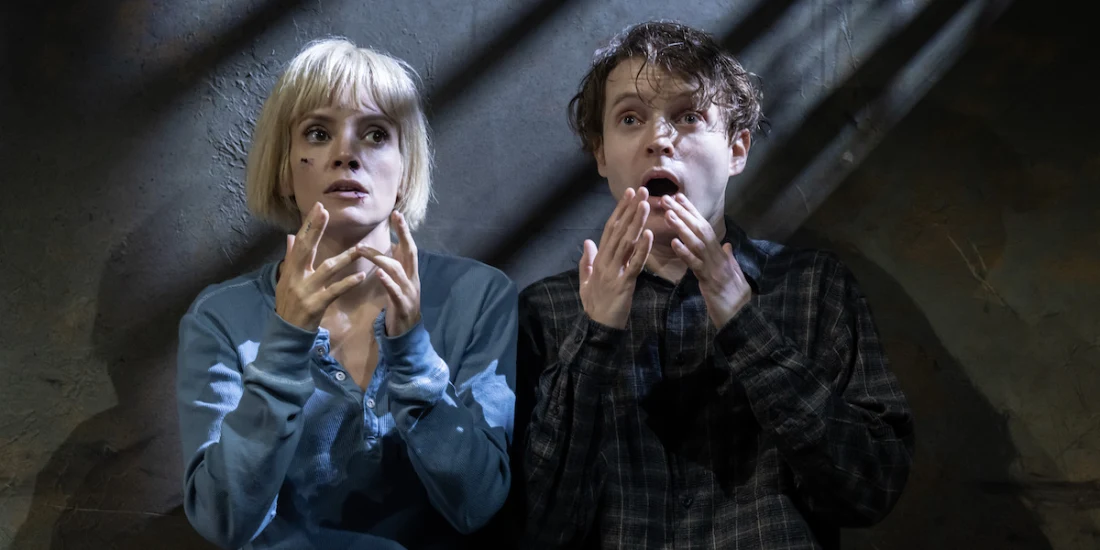'The Pillowman' review – Martin McDonagh's macabre play is gasp-inducing and richly thought-provoking
Read our four-star review of The Pillowman, starring Lily Allen and Steve Pemberton, now in performances at the Duke of York's Theatre through 2 September.
“The first duty of the storyteller is to tell the story.” So claims the writer who is under interrogation in Martin McDonagh’s pitch-black comic play The Pillowman – although she (as the character is gender-swapped here, played by Lily Allen) can’t remember if the quote is actually “first” or “only” duty. That’s crucial in this exceptionally well-crafted piece, in which every word is weighted.
Bizarrely, The Pillowman, which premiered at the National Theatre in 2003 with David Tennant, Jim Broadbent, Nigel Lindsay, and Adam Godley, never made it to the West End, but it did transfer to Broadway in 2005, led by Billy Crudup and Jeff Goldblum. Matthew Dunster’s revival, originally planned for 2020 before Covid struck (and starring Aaron Taylor-Johnson), is its very belated West End encore.
Now, it’s Allen playing the amusingly named Katurian Katurian, a prolific writer of grimmer-than-Grimm fables, usually featuring suffering children – although she has only had one published. Initially, she thinks she has been hauled in by the all-powerful police in her totalitarian state because they suspect her of political radicalism. In fact, there has been a series of horrific child murders seemingly inspired by her stories.
That all sounds unbearably gruesome, but please believe me when I tell you this is also a searingly, shockingly funny play – albeit one in which you frequently catch yourself laughing and think “Should I be?” That’s very deliberate on the part of McDonagh, as he meticulously explores big ideas like whether writers have a moral responsibility for their output, or whether art trumps all.
There are also constant meta interjections from the characters. After violent policeman Ariel knocks Katurian to the floor, detective Tupolski calmly points out: “I’m the good cop, he’s the bad cop.” Their Pinteresque interrogation constantly swings between bureaucratic pedantry, thuggish torture and sheer absurdity. “This reminds me…” begins Tupolski, then admits that that’s just a rhetorical flourish.
It’s perfect territory for The League of Gentlemen and Inside No. 9’s Steve Pemberton, and he’s an absolute natural at navigating McDonagh’s mordant humour and lightning-fast changes of tone. He has a memorable set-piece sharing his own (woeful) piece of fiction, which gets more and more wincingly offensive as it goes along – a clever rug-pull after establishing his character as the more reasonable of the pair.
Wonderful, too, is Paul Kaye as Ariel, who has a hair-trigger temper but justifies his police brutality by arguing he is the saviour of children. Matthew Tennyson paints a compellingly complex picture of Katurian’s mentally disabled brother Michal: poignantly naive and vulnerable, at first, then peeling back layers that confound our expectations.
Allen, who made her West End debut in 2:22 A Ghost Story, acquits herself well as Katurian toggles between gabbling terror, trying to appease her interrogators, the odd resentful sarcastic remark, and acute distress at them targeting her brother, voice rising in hysteria.
However, the extremes of this fascinating character are missing: the huge emotional beats after each extraordinary plot twist, and in particular the nasty hinterland. Katurian has a monstrous writer’s ego; even when facing death, their biggest preoccupation is whether their stories will live on, and the “happy ending” of one tale involves feeding their creative genius at the expense of everyone else. Allen doesn’t convince with that.
Likewise, the violence is more shocking when directed at a woman, but since McDonagh isn’t addressing gender here, it’s actually a distraction. The result is to soften a character who is far more interesting if partly unlikeable, even detestable – so as to really test the audience’s sympathies.
After all, we should at least begin on Katurian’s side. Her free speech is being censored because the police don’t like her ideas – comparable to many real authoritarian regimes (or even our own government, which forced through a new law to suppress protest ahead of the Coronation). Significantly, the production has partnered with PEN International.
Conversely, the play comes up against cancel culture debates. McDonagh pushes every button here, but, unlike many right-wing posers, he does so in the service of a considered, richly engaging drama – and the piece itself argues that fiction doesn’t necessarily advance your actual worldview, or that you can find a simple message within it.
Dunster’s atmospheric production features a sliding set by Anna Fleischle that advances on us ominously. The dank, Soviet-style police station (strip lighting, grey filing cabinets, dirty blinds and fogged windows) makes way for a childhood bedroom where horrors lurk. As Katurian tells her story, the actors playing the family eerily mime their speech, and, aided by Dick Straker’s video, innocent drawings on the wall are transformed into pure nightmare fuel.
Yet McDonagh challenges the notion that a terrible childhood automatically explains, or excuses, your later actions, just as he questions whether an artist needs to suffer in order to create (shades of his recent film The Banshees of Inisherin, which, in a macabre echo, also features the severing of someone’s digits).
Sharply funny, gasp-inducing and richly thought-provoking, this is a bold, uncompromising drama that startlingly interrogates its own artistic medium. You’ll start to wonder if you can believe anyone or anything (appropriately enough in our “fake news” era), even the certainties of an old trusted form like “once upon a time.”
Photo credit: The Pillowman (Photo by Johan Persson)
Originally published on

